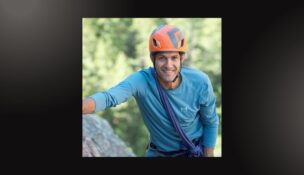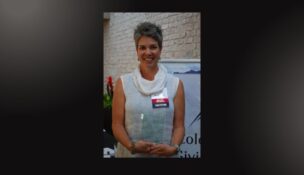Entrepreneur of 2018: From Professor to PopSockets
Dave Barnett: Relentless tinkering spawned smartphone sensation
Gigi Sukin //May 7, 2018//


Entrepreneur of 2018: From Professor to PopSockets
Dave Barnett: Relentless tinkering spawned smartphone sensation
Gigi Sukin //May 7, 2018//

Are entrepreneurs born or made?
The question serves to casually enter a conversation with the former philosophy professor turned CEO and founder of PopSockets LLC, David Barnett. His invention? A collapsible knob that has transformed consumers’ mobile phone experiences, selling more than 45 million around the globe to date.
Enterprise comes naturally to David Barnett, who as a child had one guiding philosophy: Make a buck.
“My nickname was H. Ross Perot,” he says, referring to the billionaire business magnate-turned-politician. “From the time I was 9 or 10 years old, until I graduated high school, I was this greedy little entrepreneur.”
As a Colorado kid with roots in suburban Denver, Barnett, 47, had a paper route, a mixed-tape business, a lawn mowing venture and worked at a restaurant before age 16, resulting in a house call and some scolding from the Colorado Department of Labor and Employment.
Though his reservoir of hustle dried up when he entered college – he admits he partied and rarely went to class – Barnett got his groove back when he stumbled upon physics. The deeper he dove, the more questions he had, and he shifted focus to philosophy, going on to earn a Ph.D. from New York University in 2003, taking professor gigs there, at the University of Vermont, and finally, his “dream job,” at the University of Colorado-Boulder in 2005.
Barnett says the highlight of his professional life as a philosopher was “waking up students' minds,” particularly in introductory courses. “These kids had never thought critically before.”
Throughout his young life and academic career, Barnett continued toiling and inventing. He conceived of a mall kiosk to produce and disseminate personalized greetings; he crafted a tool in college called “Man’s Little Helper,” for more hygienic toilet seat experiences; and he collaborated on an energy efficiency auditing and on-bill financing business in Boulder called Sozolate that never quite got off the ground.
At his Sunshine Canyon home one day in 2010, Barnett marched with his iPhone 3 and a snarled set of headphones to JOANN Fabric & Craft Store in Boulder, in search of a resolution to a frequent frustration. He purchased two inch-and-a-half black buttons, glued them to the back of his mobile phone, wrapped the headset around the new protrusions and … voila.

“I did not originally intend to commercialize this,” Barnett says of his invention, now known as the PopSockets grip.
He says he has colleagues and loved ones to thank for their playful poking at his unsightly apparatus, prompting his ongoing tinkering.
Barnett eventually conceived a mechanism that allowed the button to expand and collapse, originally fabricating and testing this accordion functionality – since, patented – by cutting up kitchen funnels he found under the sink. He taught himself computer-aided design and drafting on CU’s campus and designed hundreds of prototypes all while still serving on staff at CU.
In 2010, Barnett lost his home to a wildfire and put the insurance money he received toward his young business.
The year 2012 was full of milestones for Barnett and his burgeoning brand.
He launched a Kickstarter campaign that raised $18,000. And he signed an exclusive licensing deal with Case-Mate to manufacture smart phone covers with his gadget fully integrated. Though validating, the deal fell through within a year, giving him time to perfect his standalone grip-stand.
Barnett also told his then-girlfriend (now wife) he was quitting his job to focus on his startup full-time that year.

“I was ready to leave academia,” Barnett says.
Between 2014 and 2015, he had raised nearly $500,000 from friends, family and fans, and he officially launched the business out of his Boulder garage.
“I lent him a little money in the beginning,” says Michael Zakin, PopSockets’ influencer programs manager and Barnett’s friend of 30 years. “He asked if I wanted it to be a loan or equity, and at the time, I said a loan. I had no idea PopSockets was going to become what it is today. It was the biggest financial mistake of my life.”
To date, the Colorado company has not taken a single institutional investment dollar, and as of 2015, is profitable.
But it wasn’t all smooth sailing.
Bumps along the way included a series of manufacturing and supply-chain hiccups between 2013 and 2015, including thousands of defective products and packaging problems from overseas manufacturers.
Barnett ate the losses and overcame the obstacles, navigating rough waters with only a few hands on-deck in the early years. PopSockets grips were a big hit at the 2014 PPAI Expo, an annual industry trade show in Las Vegas. Turns out, “They’re like little billboards you carry with you everywhere,” Barnett says of his creation, after selling 20,000 branded PopSockets grips to distributors he connected with at the expo.
In 2014, Barnett sold 30,000 units, and by the following year, thanks to the company’s first major retail deal with T-Mobile, 300,000 PopSockets sold.

“I’ve been told by various business experts this is the perfect business,” Barnett says. “The product is small, low-cost to make, low-cost to ship, and customizable. It’s really for anyone who owns a smartphone.”
In 2016, PopSockets LLC inked its first major influencer deal with Jenna Marbles, a YouTube personality, thanks to Zikan, who had spent the bulk of his career in Hollywood.
To date, 45 million units have sold, and this year the company is on track to sell another 60 million products.
Meanwhile, Barnett has had to learn to be a leader on the fly.
At the outset, he didn’t have money to hire “anybody but college students; a handful of people who had no experience doing finance, engineering, quality control, ordering, printing …” Once he had the resources to hire people with expertise, he had to lean on his network and build confidence in the company.
“It struck me – why would some guy want to come to PopSockets if he was taking a lesser role at a relatively unknown company?” Barnett recalls. He describes this as a turning point, when he realized “we could attract top talent.”
Today, that includes Bob Africa, the former president of Kidrobot, now PopSockets’ chief of staff; Becky Gebhardt, former chief marketing officer at Land’s End, and now PopSockets’ CMO; and John McCarvel, the former CEO of Crocs, who now sits on Barnett’s advisory board.
“He made me an offer I couldn’t refuse,” Zakin says, “all for a little piece of plastic.”
Zakin moved to Boulder from Los Angeles last year following a career in film and television production that included a Golden Globe for his work on the Amazon original series, “Mozart in the Jungle.”

In building his team, Barnett looks for independent problem-solvers and people who are highly motivated.
“I know there are a lot of CEOs who are described as servant leaders,” Barnett says. “Their philosophy is to help all the people they’ve hired. That’s not me. I want to hire people who can free up my time, so I can focus on something else. That may sound unsupportive, but it’s working.”
PopSockets LLC has ramped up its corporate social responsibility strategy within the last year.
The company is donating 10 percent of its online net proceeds and tens of thousands of PopSockets to help people living with arthritis, Parkinson’s Disease, spinal and brain injuries. And in April, Popsockets LLC launched a charitable program alongside Craig Hospital in Denver.
With a team of nearly 150 scattered between the Boulder headquarters and a handful of satellite offices around the globe, Barnett says he can start “acting more like a CEO.”
“I’ve been down in the trenches for so long,” he says. “Now, I can talk about vision, product, marketing, at a high-level. I can see the forest, instead of swinging around on trees.”
For its future, Barnett sees the product as a platform. He likes the notion of “attachables” as a new category under the umbrella of wearables, dreaming up examples such as speakers, batteries and breathalyzers that could integrate with the phone’s hardware and software. The company recently released a car vent mount, and a wallet is slated for unveiling later in the year, as well as a variety of new styles and materials, from extensions of the Swarovski crystal collection to leathers, metals and faux snake skin – Barnett is a vegetarian and supporter of animal welfare initiatives.
Barnett says he believes his entrepreneurial accomplishments stem from his ability to remain calm amid chaos. “I’m a robot,” he says. “Ask my wife: I’m not one to stress easily.”
“Dave has always been someone I admire,” Zakin says. “He’s always been an entrepreneur. His purebrain power combined with the fact that he’s a good person – kind, ethical and fair. He uses his critical thinking to solve complex challenges. I think that’s his greatest strength.”
Again, we ask Barnett, are entrepreneurs born or made?
he says, without pause or further explanation.

























